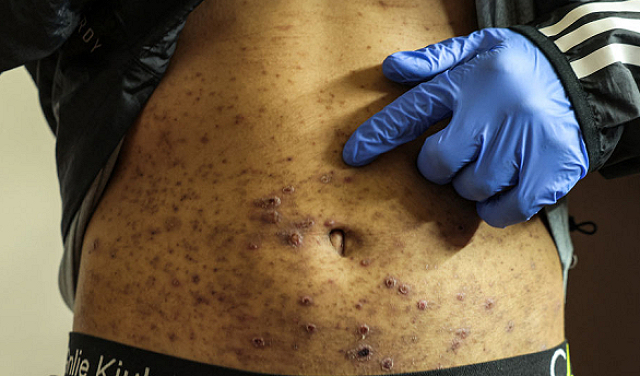Israeli occupation spreads ‘scabies’ among prisoners, denies them treatment, food, cleaning supplies
OCCUPIED PALESTINE, Sept. 04 (YPA) – The Palestinian Prisoners’ Affairs Center has warned of significant dangers threatening the lives of Palestinian prisoners in the Israeli occupation jails due to the alarming spread of the scabies epidemic.
The center, which specializes in defending the conditions of prisoners, affirmed that the prisons lack the most basic human living standards, while the occupation authorities pursue a policy of deliberate medical negligence.
The center pointed out that punitive measures against prisoners include preventing them from bathing, cutting off water, confiscating hygiene necessities like soap, and prohibiting shaving, haircuts, and new underwear.
It explained that due to the shortage of clothes and Israeli punishments against them, “prisoners in occupation prisons are forced to wash their clothes and wear them while they are still wet.”
The center noted that the occupation authorities’ measures against prisoners aim to “break their will and slowly kill them,” calling on the World Health Organization, Doctors Without Borders, and the Red Cross to “take urgent action,” stating that the humanitarian situation in the prisons “has become catastrophic.”
The Commission of Detainees and Ex-Detainees Affairs had previously stated that the “scabies” disease is ravaging prisoners in occupation jails and that the occupation is deliberately neglecting them medically. It also warned of the danger of depriving prisoners of food, confirming that the occupation is practicing a systematic starvation policy that threatens their lives.
Since October 7, 2023, the occupation authorities have taken numerous measures against Palestinian prisoners in their jails. These include reducing cleaning supplies, shower times, and food quantities, in addition to increasing overcrowding due to a significant rise in arrests.
Among the factors contributing to the spread of disease are the prisoners’ inability to shower regularly and the lack of clean clothes. Most prisoners only have one change of clothes as there are no washing machines, forcing them to wash their clothes by hand.
Prison authorities also prevent them from hanging clothes to dry, leaving them damp. This has significantly contributed to the spread of skin diseases among prisoners. The prison administration does not respond to repeated requests from prisoners for medical treatment or even for visits to the clinic.
Official figures indicate that the total number of prisoners and detainees in occupation prisons has risen to over 11,000, most of whom are administrative detainees and those held in custody.
The number of prisoners and detainees in Israeli occupation prisons as of early September 2025 is over 11,100. This number does not include detainees held in the occupation army’s camps. This is the highest number since the outbreak of the Al-Aqsa “Intifada” in 2000.
Out of the total number, there are 49 female prisoners, including two from Gaza, 400 children, and 3,577 administrative detainees. The number of detainees classified as “unlawful combatants” has reached 2,662. This figure does not include all detainees from Gaza held in the occupation army’s camps.
YPA


